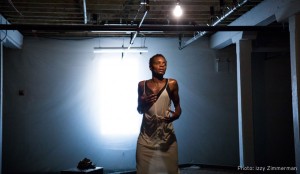Encircled in white clothe, the stage and seating are drawn together. The softly lit performer’s space is set with plants, tipped lamps, and plastic bags caught by an unseen breeze. Turned away from the audience, making curving pulsating shadows on the curtains she faces, solo performer Okwui Okpokwasili moves virtuosically—pure and constant movement set to looping sounds. The music elevates to a fevered noise loop of aggressive conversation. The solo body articulates a blend of pedestrian posturing and modern and West African dance. As the body turns to face the audience, the noise and talk falls away, leaving a lone noisy trill to accompany the performer’s continued movement. Focus shifts from the body making shadow to the body itself.
Sweat drenched, facing forward, the dancer steps up to the microphone as classical music climaxes: “I want to share something with you. It’s a note, passed between two girls at the tender age of 11. One of which was me.”
Beginning here, we follow the notes through a journey of sex, friendship, beauty, blackness, and love for two young girls in the Bronx. Many audience members laugh with recognition at both the experience and naivete of notes passed between these two friends. Cherry-popping, buying loosies for a mother’s boyfriend, going steady, getting titties, and double-dutch ropes serve as markers to navigate the hot cement landscape of these young girls’ lives.

Deeply exploring growing up young, female, brown, and poor in the Bronx, BRONX GOTHIC deftly traces the nuances of competition and the crushing loss of friendship. Blow smoke rings and smile or enjoy the power of ugliness—both press against the constant threat of being overtaken.
The grown woman, the survivor, testifies as she could not (would not) forget herself or her friend. At times a living nightmare, BRONX GOTHIC challenges the audience to both relate and admit passive observation. “Am I awake?” the performer asks us to ask ourselves. Fight, be smart, wake up—power and freedom may be taken away.
Okwui Okpokwasili’s agility and timing is moving, always asking and telling. Coming to an end, the piece leaves the audience sitting. Waiting. Is it over Describing a nightmare on the beach, feet on fire, water boiling, a note says, “And that’s it. I’m awake. Bam.”
The audience is rapt throughout, packed, and breathing it all in. Once again picking herself up, Okwui Okpokwasili’s sings “You better gather your skin girl. Pull it together. After he’s done here, he’s done forever, forever.” The survivor testifies; strong, moving, and very much awake.
[FringeArts, 140 N. Columbus Boulevard] March 11-12, 2016; fringearts.com.
